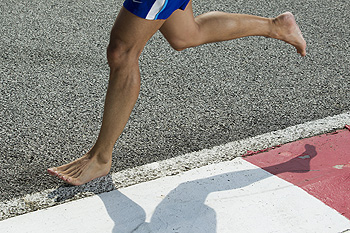 It’s important to practice good foot care, and this is especially true of the elderly population. This may include checking the feet daily, and if this proves to be a difficult task, a family member may be able to help. Recent research has shown that it's beneficial to elevate the feet as much as possible, and this will enable the blood to circulate freely. The feet typically get larger as the aging process occurs, and a key element in having healthy feet is to choose shoes that fit properly and comfortably. Some of the foot problems that elderly people need to be aware of developing are fungal and bacterial conditions, and this can include athlete’s foot and warts. Prevention of these conditions and others such as corns, calluses, and ingrown toenails is imperative in maintaining good foot health. Please consider scheduling a consultation with a podiatrist for additional information on how to take care of elderly feet.
It’s important to practice good foot care, and this is especially true of the elderly population. This may include checking the feet daily, and if this proves to be a difficult task, a family member may be able to help. Recent research has shown that it's beneficial to elevate the feet as much as possible, and this will enable the blood to circulate freely. The feet typically get larger as the aging process occurs, and a key element in having healthy feet is to choose shoes that fit properly and comfortably. Some of the foot problems that elderly people need to be aware of developing are fungal and bacterial conditions, and this can include athlete’s foot and warts. Prevention of these conditions and others such as corns, calluses, and ingrown toenails is imperative in maintaining good foot health. Please consider scheduling a consultation with a podiatrist for additional information on how to take care of elderly feet.
Proper foot care is something many older adults forget to consider. If you have any concerns about your feet and ankles, contact one of our podiatrists from Canonsburg Podiatry Associates. Our doctors can provide the care you need to keep you pain-free and on your feet.
The Elderly and Their Feet
As we age we start to notice many changes in our body, but the elder population may not notice them right away. Medical conditions may prevent the elderly to take notice of their foot health right away. Poor vision is a lead contributor to not taking action for the elderly.
Common Conditions
- Neuropathy – can reduce feeling in the feet and can hide many life-threatening medical conditions.
- Reduced flexibility – prevents the ability of proper toenail trimming, and foot cleaning. If left untreated, it may lead to further medical issues.
- Foot sores – amongst the older population can be serious before they are discovered. Some of the problematic conditions they may face are:
- Gouging toenails affecting nearby toe
- Shoes that don’t fit properly
- Pressure sores
- Loss of circulation in legs & feet
- Edema & swelling of feet and ankles
Susceptible Infections
Diabetes and poor circulation can cause general loss of sensitivity over the years, turning a simple cut into a serious issue.
If you have any questions please feel free to contact our office located in Canonsburg and McMurray, PA . We offer the newest diagnostic and treatment technologies for all your foot and ankle needs.



